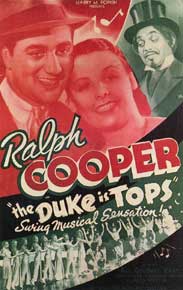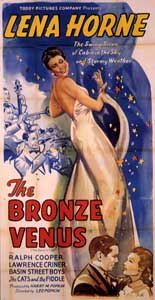 Duke Davis (Ralph Cooper) has produced a theatrical review called The Sepia Scandals, headlined by Ethel Andrews (Lena Horne in her big screen debut), in The Duke is Tops (1938), an all-black-cast musical of considerable merit.
Duke Davis (Ralph Cooper) has produced a theatrical review called The Sepia Scandals, headlined by Ethel Andrews (Lena Horne in her big screen debut), in The Duke is Tops (1938), an all-black-cast musical of considerable merit.
The film was re-released in 1944 as The Bronze Venus at which time it even reached some white theaters after Lena's breakthrough roles in Stormy Weather (1943) & Cabin in the Sky (1943). It thus became more broadly known than most films iniitially made for black theaters.
I've seen some negative reviews of this film but I have to assume anyone who doesn't like it is not used to the guerilla-filmmaking of no-budget directors & producers who had to recoup their expenses in the limited number of venues in black neighborhoods of major cities.
To me The Duke is Tops seemed a goodhearted film which overcame all the limitations of those segregation days in order to come off sweet & grand.
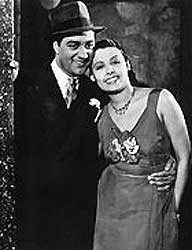 Besides being full to the brim with entertaining acts, The Duke is Tops also has a pleasant story, a very remarkable setting when Duke becomes part of a travelling medicine show, & the best performance of Ralph Cooper's career as a guy just so goodhearted you wish he was family. Besides being full to the brim with entertaining acts, The Duke is Tops also has a pleasant story, a very remarkable setting when Duke becomes part of a travelling medicine show, & the best performance of Ralph Cooper's career as a guy just so goodhearted you wish he was family.
Duke's Sepia Scandals review is quite a varied show, starting off with The Basin Street Boys with a ragtime number "Blackberry Baby," which they do splendidly. So right away I've got to take a side-journey to talk about these guys.
The Basin Street Boys of the 1930s were a close harmony quartet, sometimes quintet, founded by Steve Gibson, better known as part of the Red Caps. With him were Louis Dandridge, Joe Walls, Lloyd Mitchell, & Pods Hollinsworth.
A different harmony group of the mid-1940s had the same name, founded by Ormond Wilson & borrowing the name of Gibson's former group with Gibson's blessing. The new Basin Street Boys got to do recordings, but the original Basin Street Boys weren't around long enough to score a record contract.
However, these guys contributed their vocal talents to Clean Pastures (1937) & Swing Monkey Swing (1937), cartoons hard to get to see because withheld from distribution due to the race stereotypes. Which just goes to show censorship has repurcussions, in this case making it hard for anyone interested in black harmony groups to judge for themselves the merits of the Basin Street Boys' soundtrack work.
Duke's review is mainly vaudeville, so the acts include such folks as Rubberneck Holmes, an amazingly good though very odd dancer. But it's Lena as Ethel who quite naturally steals the show singing the Harvey Brooks & Ben Ellison composition "I Know You Remember," with lyrics apropos of the film, "You & I have made a small beginning..."
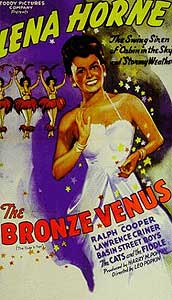 A bigshot talent scout, George Marshall (Monte Hawley), wants to contract Ethel & promote her as "the bronze nightingale." But he doesn't want her producer, Duke, who he sees as small time. A bigshot talent scout, George Marshall (Monte Hawley), wants to contract Ethel & promote her as "the bronze nightingale." But he doesn't want her producer, Duke, who he sees as small time.
Her rise could have been Duke's break, too, not to mention they were on the verge of a romantic attachment above & beyond business. But he's a rarity in show business, a selfless man. He lets Ethel believe he didn't want to produce her shows anymore anyway, & lets her sign on for the opportunity of Broadway success.
Duke has a hard time after their split, as he just can't find another headliner of Ethel's enormous talents. His old pal Mason (Vernon McCalla, miscredited as McCallum), agrees to stake his next show even without a big draw, & the show flops.
He seems as far down on his luck as any man can be, but in a tavern he encounters a friend from former times, Doc Dorando (wonderfully played by Lawrence Criner), who has fallen even lower. He responds to a pathetic plea for a loan by giving the man what honestly couldn't be spared.
Dorando has been travelling town to town selling a phony cure-all out of the back of a truck. Duke's spirits seem always to remain high, no matter the troubles. And as he ponders their mutual situation, he decides he wants to "put on a show!" even if it's just a little travelling medicine show. Soon he's on the road with Doc.
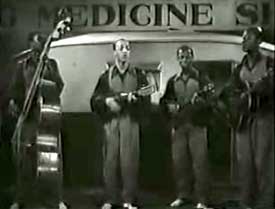 The highlight of the medicine show are the Cats & the Fiddle singing "Killin' Jive." This is a great performance, four guys harmonizing on a very jumpin' good song: The highlight of the medicine show are the Cats & the Fiddle singing "Killin' Jive." This is a great performance, four guys harmonizing on a very jumpin' good song:
"He's the man that smokes that jive/ Jive will take you for a dive/ One slip you will arrive/ When you smoke that killin' jive..."
Obviously it's a marijuana song which speaks additionally of being high & mellow, as it's the stuff that changes your whole point of view:
"Everything will seem so funny/ Darkest days will seem so sunny/ That feeling will arrive/ When you smoke that killin' jive..."
The group is as good as the early Nat King Cole Trio & come awfully close to the quality of Louis Jordan. And when the bass player lays down on the floor with his bass, think Jimi Hendrix.
The Cats & the Fiddle with their jazz vocal harmonies were at their peak in the early & mid 1940s, so this film appearance in 1938 is early for them. At the time jazz harmony groups were innovating left & right, having had the Mills Brothers as primary inspiration, followed by the Delta Rhythm Boys, the Charioteers, eventually the Ink Spots, flowing smoothly into the birth of doowop.
The group consisted of Austin Powell, Ernie Price, Chuck Barksdale & Jimmie Henderson. Lead vocalist Powell played a four-string tenor guitar. The "fiddle" was the slap-bass, played by Barksdale, who also did the bass harmonies.
First tenor Henderson played a "tipple" that sounded an awful lot like a ukelele but with broader musical possibilities, & which added enormous charm to their sound. Second tenor Price traded off playing tipple & rhythm guitar.
They got together in their native Chicago in 1937, & when they appeared in The Duke is Tops, probably nobody outside of Chicago had heard them yet. So this is another historic moment in a very pleasing film.
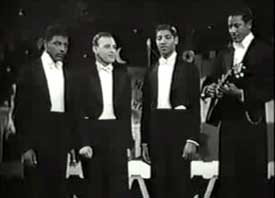 Meanwhile Ethel's career in New York hasn't had quite the expected trajectory, as Marshall turned out to be a less than stellar producer. What she needs is a good producer who can really bring out the best in her. What she needs is Duke. Meanwhile Ethel's career in New York hasn't had quite the expected trajectory, as Marshall turned out to be a less than stellar producer. What she needs is a good producer who can really bring out the best in her. What she needs is Duke.
Although she made it to Broadway's Century Club, the show has not been pulling in the audiences.
When Duke hears that her luck hasn't been what it should be, he heads to the big city to find her, & talks the Century Club owner Ferdy Fenten (Edward Thompson) into letting him completely revamp show. He has a doozy of an idea, a review that's all about a travelling medicine show.
The "Music is Medicine" review is a great hit. Duke himself sings "Harlem is Harmony" backed by the Harlemania Orchestra. It's a sweet, low song, & Willie Covan dances to it splendidly. I mean, Willie is shockingly great.
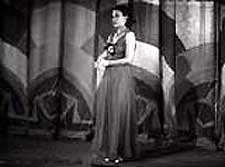 There's more fine jazz dancing to a "Jungle Rhapsody," & the Basin Street Boys are back with "Evening Swing" complete with Mills Brothers style mouth-horn. Man-oh-man wadda show. There's more fine jazz dancing to a "Jungle Rhapsody," & the Basin Street Boys are back with "Evening Swing" complete with Mills Brothers style mouth-horn. Man-oh-man wadda show.
Lena sings "Don't Let Our Love Song Turn Me Blue" with a lyric that foreshadows one of her future great roles: "True love will guide us through stormy weather." And she reprises "I Know You Remember."
The simple moral here is Ethel needed Duke, & Duke needed Ethel. Together they are greater than their separate parts.
And for my tastes this was one of the great musicals of the period, overcoming limited budget & imperfect sound equipment & thrilling me as much as any big-budget Hollywood musical.
copyright © by Paghat the Ratgirl
|
